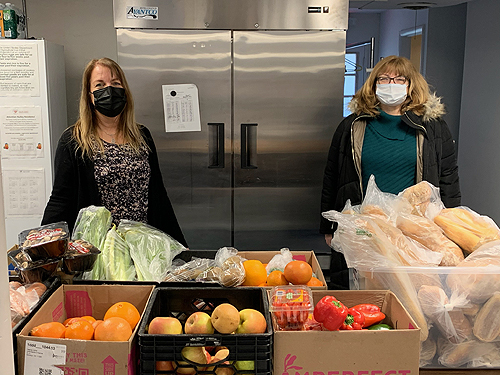-
How Case Management and The Pantry Work Together to Address Food Insecurity
- Posted on September 29, 2021
- by admin
- in All Articles, NFSB Blog
- Comments Off on How Case Management and The Pantry Work Together to Address Food Insecurity
 There has been a stereotype for decades that paints a certain picture of people with food insecurity issues. This picture shows people who are food insecure because of their own poor decisions or have always just depended on social services to survive.
There has been a stereotype for decades that paints a certain picture of people with food insecurity issues. This picture shows people who are food insecure because of their own poor decisions or have always just depended on social services to survive.As with most stereotypes, this picture is inaccurate. Food insecurity does not discriminate. People of all ages, cultures, family structures, and incomes have faced challenges that require them to seek help.
“Most people never expect to be in that position, which is the main reason why it takes so long for them to ask for help,” said Molly Clark, MSW (Master of Social Work), Case Management Coordinator at Nutley Family Service Bureau (NFSB). “Since the pandemic, even people who have had long, successful careers have dealt with food insecurity after losing their jobs. If something bad happens, your whole life can change.”
Problem Solving Through Collaboration
Different people look for help with food insecurity in different ways. Some will call to schedule an appointment with case management, while others will visit The Pantry. This is why it’s so important for Molly to collaborate closely with Joan Roake at the Pantry.For example, if someone contacts case management with food insecurity issues, Molly will automatically screen the individual to determine what services they’re eligible for and help them apply for those services. Molly will then connect them with Joan at The Pantry.
“If someone comes in for help with Medicaid, there’s a good chance they need food,” Molly said. “Financial assistance and food go hand in hand. We ask clients if they’ve eaten today and whether a lack of food is an ongoing problem. They could very well be eligible for services through The Pantry, and we can make sure they have food to eat.”
In some cases, people will contact NFSB for help in other areas of their lives but need help with food insecurity, and vice versa.
“We’re the eyes and ears for case management,” Joan said. “If we think a client of The Pantry can benefit from case management, we steer them in that direction so they can apply for SNAP (Supplemental Nutrition Assistance Program), energy assistance, and other programs.”
Immediate Food Insecurity Solutions for the Community
By taking the time to get to know each person who contacts NFSB, we can offer support in ways that the person hadn’t considered and provide them with assistance right away.A woman recently contacted case management looking for food stamps. Molly worked with this individual to determine what social services were needed and what the next steps should be. Next, Molly introduced her to Joan for services from The Pantry. She went home with food so she wouldn’t go hungry for another day.
“When you register for a program like SNAP, you don’t necessarily get food to eat immediately,” Molly said. “You have to go through the process of having your application approved, receiving your card, and going to the grocery store to buy food. When you come to NFSB, you arrive hungry and leave with food. Joan and I were so gratified that we could help her sign up for services through case management and provide her with food that day from The Pantry.”
Because of the stigma surrounding services and programs designed to address food insecurity, many people are hesitant or even embarrassed to seek assistance. Please understand that there is no shame in asking for help. If you or someone you know is struggling with food insecurity, call 973-667-1884 to contact case management or The Pantry at NFSB today.
If you enjoyed this article please consider sharing it!

















